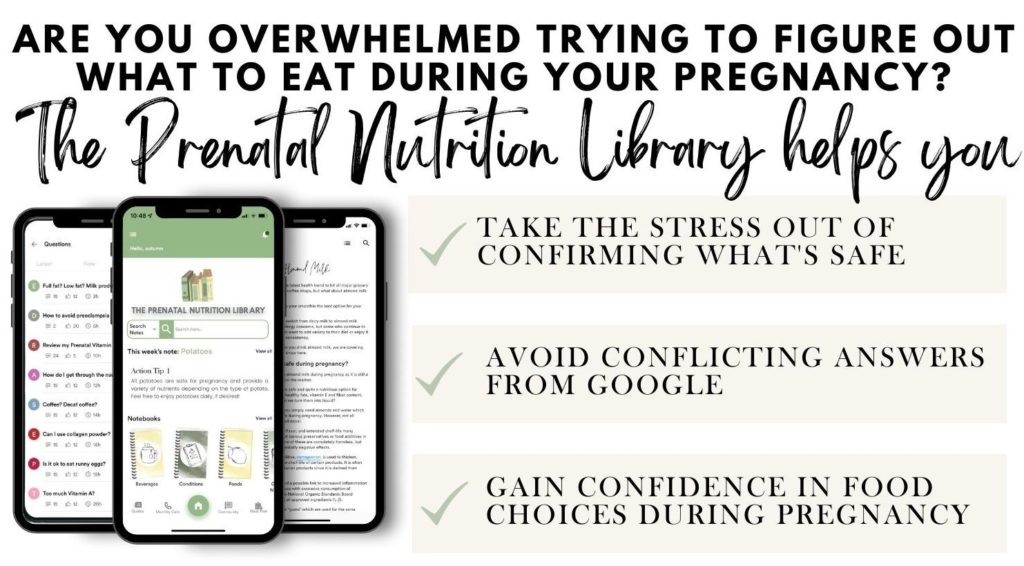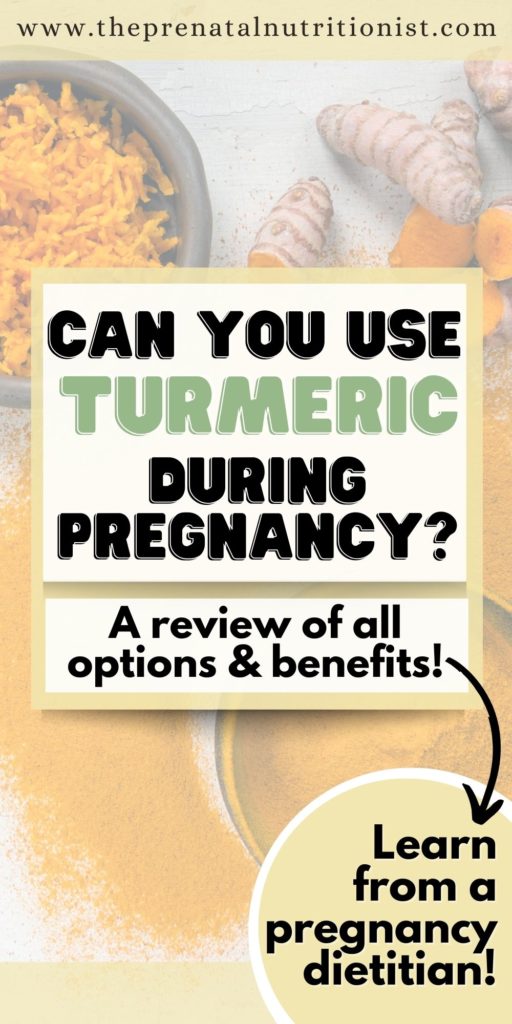
Turmeric is a brightly colored spice used for thousands of years in various cuisines and traditional medicine practices originating in Southeast Asia. As one of the key components of many yellow curries, it adds flavor and color to various dishes. Beyond sprinkling it into your cooking, you may have heard of turmeric’s numerous health benefits related to reduced inflammation, antioxidants, and even digestion.
Often referred to as a “superfood,” turmeric exists in different forms, including ground powder and turmeric capsules and supplements that pack concentrated levels of its active compound, curcumin. While research on turmeric and curcumin shows that this spice has health benefits, it’s important to practice caution when consuming supplemental spice or herb during pregnancy.
As a soon-to-be or current mother, you want to ensure you support your body and baby’s needs in the safest, most evidence-based way possible. This is a critical period for a baby’s health and development, and you may wonder about adding turmeric. I’m dedicating this post to discussing what science has uncovered regarding consuming turmeric during pregnancy.
My goal is to provide evidence-based guidance so you can make confident and informed nutritional choices that are best for both you and your growing baby every step of the way!

Turmeric While Pregnant: What You Need to Know
So, the burning question is, can you have turmeric while pregnant? When consumed in moderate culinary amounts, turmeric is safe during pregnancy. However, ingesting large amounts of turmeric may warrant caution.
Curcumin, the active ingredient in turmeric, has shown anti-fertility effects in animal (rat) models at large doses. Research suggests curcumin could potentially thin the uterine lining and interfere with implantation. Studies have also found that sperm motility was limited in mice and human sperm within 5-15 minutes of high-dose turmeric consumption. This may indicate that if you are trying to conceive, both partners would likely benefit from avoiding turmeric supplementation to promote fertility and healthy pregnancy.
The FDA categorizes turmeric as GRAS (generally recognized as safe) when consumed in normal food amounts. However, they note limited research on high-dose supplements and recommend pregnant women avoid these without physician supervision.
Most organizations agree small culinary amounts are likely not a concern. However, avoiding supplement amounts of turmeric before and during pregnancy is advised. The use of turmeric extracts also warrants caution during pregnancy.
In terms of timing, the use of small culinary amounts appears to pose minimal risk in any trimester of pregnancy. However, large quantities should generally be avoided without guidance during this crucial developmental stage.
Overall, modest turmeric consumption as part of a balanced diet is a safe option for pregnant women. However, concentrated supplemental doses above typical food intake levels are best avoided unless otherwise directed by your healthcare provider. This is due to research on rats indicating it may be potentially harmful to the mother and baby’s safety.
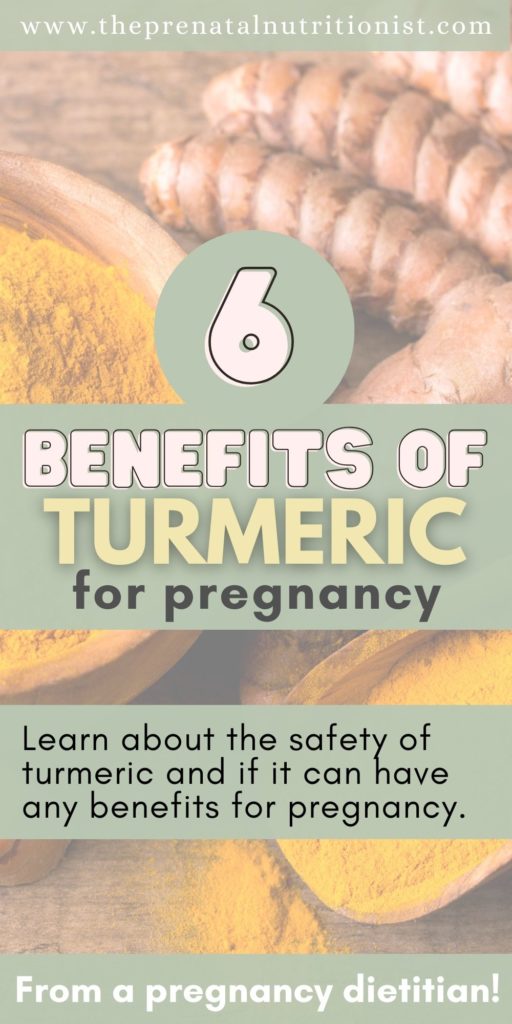
Benefits of Turmeric During Pregnancy
Reduces Inflammation
Curcumin is a powerful anti-inflammatory agent. It can help reduce inflammation throughout the body, including in joints and tissues stretched during pregnancy. Curcumin works by modulating inflammatory biomarkers like prostaglandins and cytokines.
Supports Liver Function
The liver acts as the body’s filter, metabolizing nutrients, detoxifying harmful substances, and producing vital proteins necessary for various bodily functions. It works hard during and outside of pregnancy. Curcumin assists with this by promoting bile secretion and antioxidant activity in the liver.
May Support Better Mood
Curcumin is thought to impact serotonin and dopamine levels, which influence mood. Limited research also links it to decreased cortisol, the “stress hormone.” There are so many factors at play, but the positive effect of turmeric on mood could benefit expecting mothers at risk for perinatal depression and anxiety.
Aids Digestion Issues
Digestive-related complaints like heartburn, constipation, and indigestion affect many during pregnancy. Curcumin may help by stimulating bile production and relaxing gastrointestinal muscles involved in digestion. Its anti-inflammatory benefits may also promote gut health and healing.
More on how to manage gastrointestinal symptoms during pregnancy HERE.
May Support Brain Health and Development
Early brain development occurs rapidly in utero. One study discusses that curcumin may be protective for the fetal brain. Neuroprotective effects could benefit the growing baby’s brain and nerve cells. However, more research is needed to fully understand turmeric or curcumin’s specific impact and mechanisms on fetal brain development.
For my food list for baby brain development, check HERE.
Supports Cardiovascular Health
Curcumin may lower inflammation and oxidation associated with improved heart health. Inflammation and oxidation are key factors in heart disease development. Some research even associates curcumin intake with a reduced risk of preeclampsia by decreasing inflammatory-promoting factors. Preeclampsia is high blood pressure during pregnancy. Curcumin’s antioxidant activity can also support overall health and well-being.
While more research is still needed, turmeric’s anti-inflammatory compounds may have useful applications for supporting maternal wellness and fetal development. Especially when enjoyed in moderation as part of a nutritious diet. The greatest benefits seem centered around curcumin’s possible impact on inflammation and oxidative stress.
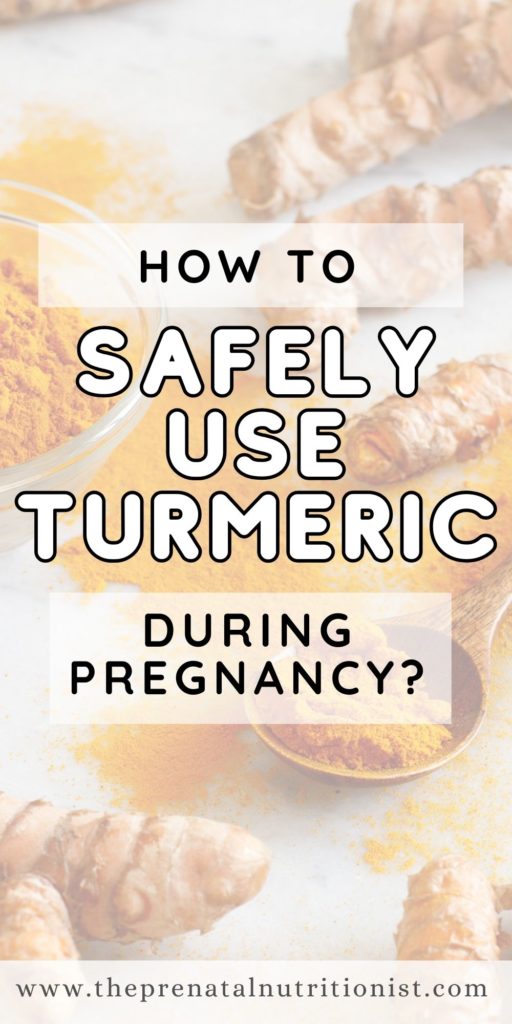
Turmeric for Pregnant Women
When looking to gain turmeric’s potential benefits, many ask about the safety and bioavailability of different forms of turmeric, including supplements. Let’s explore common options in more detail.
Turmeric Powder (Spice)
Turmeric powder is produced by grinding the dried rhizome or root of the Curcuma longa plant. This process preserves the active constituents that give turmeric its bright golden-yellow color and potent anti-inflammatory properties.
Turmeric powder contains 2-8% curcuminoids, natural plant pigments that provide turmeric’s health-promoting effects. It also maintains other beneficial compounds like volatile oils, carotenoids, and aromatic substances in the fresh root.
Turmeric powder is often used as a culinary spice. When sourced from a reputable brand, it is generally considered safe in moderation during pregnancy. At doses of up to 1/4 teaspoon daily (100 mg of curcumin), it does not appear to pose significant risks to the mother or baby based on current research.
Turmeric has a warm, slightly bitter, and earthy flavor with a subtle peppery and mustard-like aroma. The spice can be added to juices, smoothies, eggs, rice dishes, soups, or mixed in warm milk to make a “golden milk latte.” Remember, its strong color can stain, so handle it carefully and start with small amounts to adjust to your taste preferences.
Turmeric Capsule
Turmeric capsules offer a convenient, pre-measured way to consume turmeric daily. Capsules contain concentrated amounts of curcumin. Curcumin is the active compound in turmeric. They’re typically taken orally with water. The supplement is taken according to the recommended dosage on the product label, often once or twice a day.
However, safety data is limited for pregnancy. As mentioned above, some rat studies indicate it could be potentially harmful for mom and baby to consume turmeric in higher doses.
Most capsules standardize turmeric extracts to contain 95% curcuminoids for efficiency. This provides a more concentrated dose than food sources. Due to the lack of research on high-potency extracts during pregnancy, avoiding turmeric capsules is generally recommended unless otherwise directed by your healthcare provider.
It’s advised for both partners to skip this form of turmeric during preconception and pregnancy.
Turmeric Extracts
Turmeric extracts represent a highly concentrated supplemental form of curcuminoids. Additional precautions are appropriate given the limited pregnancy safety research in this category.
Extracts maximize curcuminoid content, with some varieties containing up to 95% curcuminoids through an ethanol or water extraction process.
Due to the lack of data on extracts during pregnancy, it is strongly advised to avoid all turmeric extracts and consult your healthcare provider before using any product listed as an “extract.”
Do not attempt self-dosing of any turmeric extract while pregnant. Review potential risks/benefits only under a physician’s guidance and supervision.
If cleared by an OB/GYN for medical need after thorough discussion, start with the lowest possible dose (e.g., 50 mg turmeric extract) and closely monitor side effects.
Turmeric with Bioperine
Some turmeric supplements add Bioperine (piperine) from black pepper to enhance curcumin absorption. Bioperine is an extract derived from black pepper fruits (piperine). By inhibiting enzymes that metabolize nutrients in the digestive system, Bioperine may increase the absorption and effectiveness of curcumin.
Again, it is not recommended to consume turmeric supplements in any form during pregnancy. However, you can enjoy enhanced bioavailability by enjoying a dash of black pepper alongside turmeric-flavored dishes.
Eating black pepper as part of your food can provide small amounts of piperine, which could potentially aid in the absorption of certain nutrients, similar to the way Bioperine does in supplements. The concentration of piperine in black pepper used in cooking is lower compared to the highly concentrated form found in Bioperine supplements.
In summary, turmeric powder (in the form of turmeric spice) is the safest option when introducing turmeric during pregnancy. Taking a turmeric supplement in any form during pregnancy or preconception is not advised. A balanced diet with modest culinary inclusion can offer health benefits and flavor if you enjoy turmeric.
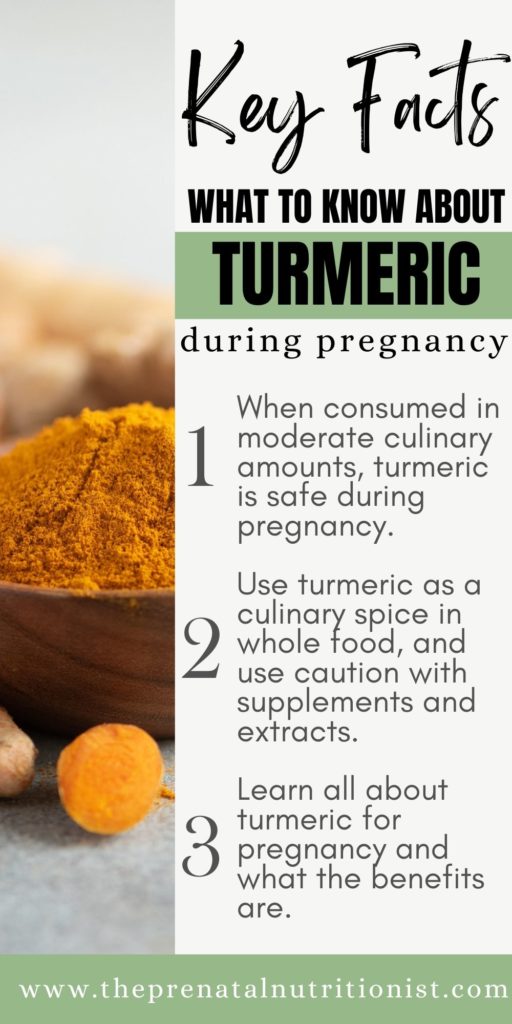
In conclusion, turmeric shows potential health benefits for both mother and baby primarily due to its anti-inflammatory properties.
The moderate use of turmeric as a culinary spice in whole food form appears to be generally safe during pregnancy for most women. Small amounts of turmeric powder (spice) used in well-rounded meals are unlikely to pose risks. However, when it comes to supplemental turmeric in the form of high-dose capsules, extracts, or other concentrated preparations, it’s best to avoid it. Due to limited human studies focused specifically on pregnancy and rat studies showing potential harm, it is best to exercise an abundance of caution. Always consult your OB-GYN or midwife before taking supplemental turmeric or other supplements during pregnancy.
Always select reputable brands to reduce the risk of heavy metal contamination in spices. Even small amounts of whole-food turmeric are best consumed in a healthy, balanced diet. With mindful use and precautions, turmeric may provide benefits for nurturing your wellness and your baby’s growth during these precious months. Overall, moderation is prudent when consuming turmeric and curcumin during pregnancy.
Check out The Prenatal Nutritionist Blog for more blog posts on beneficial foods to eat (and not eat) during pregnancy. There, you’ll find articles like Ashwagandha and Pregnancy, Healthy Breakfast Ideas for Pregnant Women, and What Not To Drink While Pregnant.
For complete peace of mind about what you can safely enjoy and what to avoid while pregnant, go to The Prenatal Nutrition Library! It is the first app and searchable database for food during pregnancy, so that you will have answers within seconds.
The Prenatal Nutrition Library will help you gain confidence in your food choices, avoid conflicting answers from Google, and know what to eat for a healthy pregnancy.



